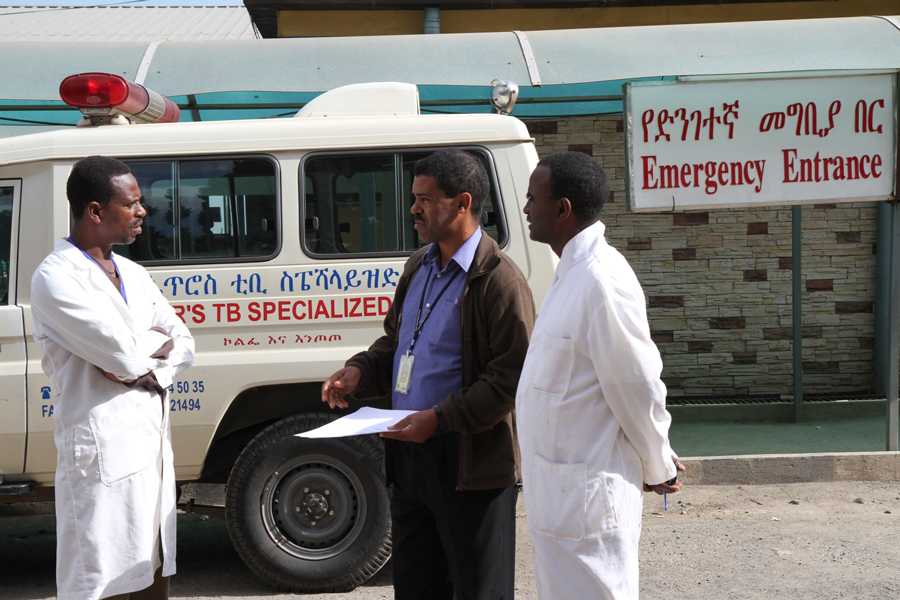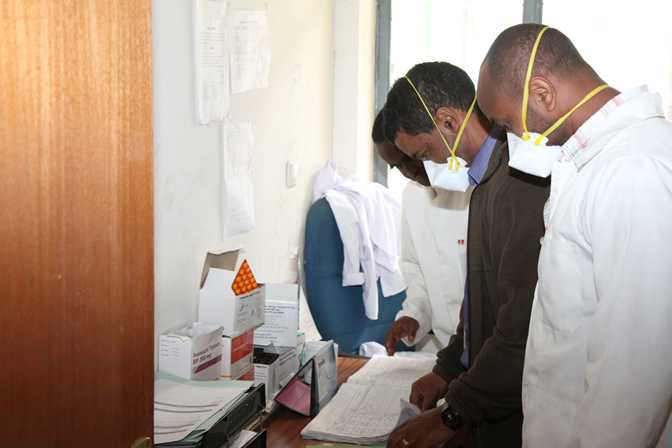Improving TB/HIV Service Delivery and Health Outcomes in Ethiopia: A Profile of Dr. Beniam Feleke
Dr. Beniam Feleke has played an integral part in Ethiopia’s response to its TB and HIV epidemics during the course of his career, both in his role as a clinician and as a CDC Technical Officer. Below he relates some of his observations on improvements in TB and HIV service delivery in Ethiopia and his work with CDC.

Dr. Beniam Feleke, CDC-Ethiopia TB/HIV Technical Officer (middle) speaks to facility clinicians while conducting a hospital site visit. Photo source: Asmamaw Metaferia, CDC-Ethiopia
Related Links
Working as a clinician to treat patients with TB and HIV
“In 1992 I began working with St. Peter’s TB Specialized Hospital in Addis Ababa, Ethiopia. The hospital had close to 200 beds and acted as a referral center for the whole country for seriously ill TB patients and those with treatment-related complications. Some patients had serious life threatening adverse reactions to treatment with Thiacetazone, a medication used in a fixed-dose combination available for TB treatment at that time. Rates of HIV co-infection among TB patients were very high, and there was no treatment for HIV or multidrug resistant TB. As a result, patient mortality was very high, approaching 20%. The hospital had TB microscopy services and one old X-ray machine. The only TB culture laboratory for confirming drug-resistant TB was located at the national TB reference laboratory that was accessible only to selected facilities through sample and patient referral.”
“In 2005, things began to change. Free antiretroviral therapy (ART) for HIV was started in parts of Ethiopia and, with the support of the Global Fund and U.S. President’s Emergency Plan for AIDS Relief (PEPFAR), was scaled up in the following years to include all regions of the country. As a clinician working at a high case load TB hospital for about 15 years, I observed significant clinical improvement following the introduction of the ART program, with reduced hospital stays by patients and decreased mortality due to TB. ”
Promoting quality services and building capacity through CDC
“I knew about CDC and its reputation as a renowned public health institution since I was a medical student and was excited to join their office in Ethiopia in 2006, serving first as a Palliative Care Technical Officer and since 2008 as a TB/HIV Program Technical Officer. CDC-Ethiopia’s priority TB/HIV activities include promoting standardized quality TB and TB/HIV care at all health facilities, and supporting human resource capacity building for TB/HIV program management and service delivery through staff training and mentorship. CDC also supports improved quality of diagnostic services for TB and drug-resistant TB. To address TB and HIV in children and families, CDC advocates a family-focused approach that emphasizes screening and investigating partners, family members, and household contacts for both TB and HIV.”
Improved service delivery leads to better health outcomes

Dr. Feleke (middle) reviewing facility TB register during site visit. Photo source: Asmamaw Metaferia (CDC-Ethiopia)
“Since I first joined CDC, I have observed improvements in TB and HIV program management at national and subnational levels. Access to TB/HIV services has significantly improved (from 9 pilot HIV treatment sites in 2006 to about 900 sites currently) and the quality of TB/HIV care has improved as well. Multidrug-resistant TB treatment was piloted in 2010 and scaled up to 20 treatment initiating centers and many more treatment follow-up centers. Capacity, quality, technology and access to TB diagnostic services have significantly improved. TB culture laboratories have increased from only one site in 2009 to nine sites. New and existing cases of TB are now declining for the first time in the history of TB control in Ethiopia. TB and TB/HIV research outputs have significantly increased and surveillance has been strengthened. Notably, there have been two national TB program reviews, a national TB prevalence survey, and a national TB drug-resistance survey.”
“I consider myself privileged to work for CDC and to contribute to the fight against two of the most important public health problems in my country,” concludes Dr. Feleke.
- Page last reviewed: March 17, 2015
- Page last updated: March 17, 2015
- Content source:
Global Health
Notice: Linking to a non-federal site does not constitute an endorsement by HHS, CDC or any of its employees of the sponsors or the information and products presented on the site.


 ShareCompartir
ShareCompartir